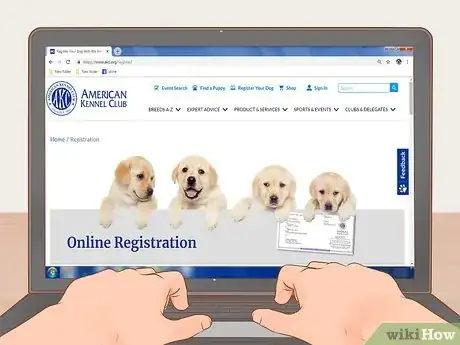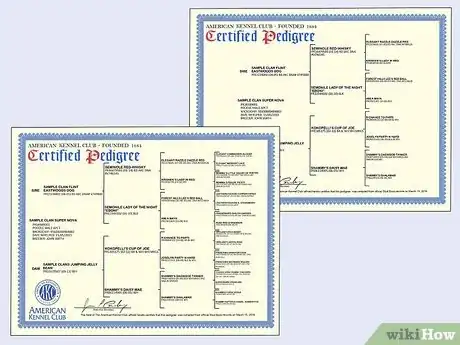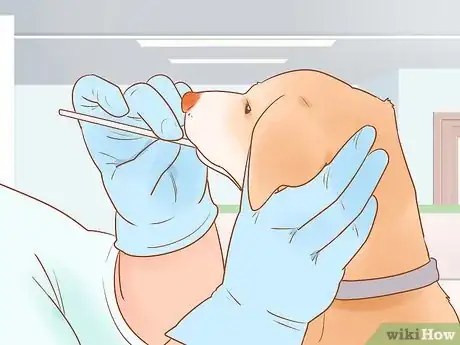This article was co-authored by April Power. April Power is a Dog Breeder and the Owner of Power Goldendoodles in Boise Idaho. She places her puppies all around the United States, specializing in breeding English Teddybear Goldendoodle puppies. In June 2020, We Love Doodles named Power Goldendoodles as one of the 9 Best Goldendoodle breeders who sell in California.
This article has been viewed 88,817 times.
If you have a dog that is purebred and that has been transferred to you according to the regulations of the kennel club it belongs to, it should have a pedigree record. This record contains information such as the dog’s name and registration number, and the names of its ancestors. If you have lost your copy of your dog’s pedigree, or just want to check the information contained in its pedigree record, you can obtain a certified copy of the information from its kennel club. You may also be able to verify your dog's parentage through DNA testing. Note that "pedigree" is not interchangeable with "purebred" — a pedigree includes specific information about a dog's family lineage, not just breed information. If you're trying to determine your dog's breed, try How to Determine Your Dog's Breed.
Steps
Ordering a Copy of Your Dog’s Pedigree Certificate Online
-
1Contact your kennel club to get a pedigree certificate. Some kennel clubs now offer online certifications of a dog’s pedigree.[1] In order to find out whether or not this option is available to you, contact the kennel club your dog is registered with. Prices and information for these online certificates will vary depending on your kennel club and the type of certificate you would like. For instance:
- Four generation pedigree certificates are available in hard copy from the American Kennel Club (AKC) starting at $32.[2]
- Online pedigree certifications from the AKC start at $15 for four generations and $17 for five.
- The AKC also offers DNA testing for purebred AKC registerable breeds only. The DNA testing does not evaluate the breed of the dog nor does it replace AKC registration requirements.
- Pedigree certificates from the Kennel Club (UK) range from £10 (three-generation pedigree) to £23 (enhanced five-generation pedigree).[3]
-
2Create an account with the kennel club website. To order an online copy of your dog’s pedigree, you may need to create an account with your kennel club’s website first. Visit the website and search for “pedigree” or “pedigree certificate,” and follow the directions provided.
- You can also call your kennel club’s customer service line for assistance.
- Be prepared to provide your dog’s kennel club registration number, as well as contact and payment details.
- If you do not have your dog's registration number, you may be able to search the kennel's registry database for your dog by name and breed.
- You can order a pedigree certificate from the Kennel Club (UK) simply by visiting its website and filling out a form. You do not need to create an account, but you will need to provide your dog’s name and kennel registration number, as well as your contact details.
Advertisement -
3Begin the ordering process. Visit the website of your kennel club. If you have an account with the club, log in. Navigate toward the section of the side dedicated to pedigree certificates, and follow the instructions provided.[4] Provide your dog’s registration number (or name and breed, if applicable), and select the type of pedigree certificate you would like.[5]
- If you do not have its registration number, you may be able to enter your dog’s breed and name and select it, choosing from among several dogs of the same name, if applicable.
-
4Enter your payment information and any other necessary information (such as an email address) to complete your order. Look for a confirmation that your order has been successfully received; this may be emailed to you, or appear onscreen at the end of the ordering process.
-
5Wait to receive your dog’s pedigree certification. Once you have ordered the certification, it may take a short time (such as fifteen minutes) to generate. If you have an online account with your kennel club, it may list the order as “in process” or “generating.”[6]
-
6Save the certification. Once your dog’s pedigree certification has been generated, you can review the information. The report will list your dog’s name and registration number, as well as information about its ancestors. You should save a copy of the certification by using your browser’s “Save As” function.[7]
Ordering a Hard Copy of the Pedigree Certificate
-
1Choose which type of certification you want. Your kennel club may offer several types of pedigree records. The AKC, for instance, offers two types of pedigree certificates for registered dogs, three-generation and four-generation, while the Kennel Club (UK) offers three- and five-generation certificates.[8] [9] These certificates will vary by price and by the information they report. For instance:
- A three-generation certification from the AKC provides the names, registration numbers, and coat colors for fourteen immediate ancestors of your dog. This certification costs $25.
- A four-generation certification from the AKC provides the names, registration numbers, and coat colors for thirty immediate ancestors of your dog. This certification costs $32.
-
2Order the certification.[10] Contact your kennel club for specific information about how to order a pedigree certificate for your dog. You may have several methods available for ordering a certificate. If your dog is registered with the AKC, for instance, you can order a hard copy pedigree certificate by using one of the following methods:
- To order your certification by mail, send your request (listing your dog’s registration number or name and breed, your contact details, and the type of pedigree certificate you would like) along with a check (payable to AKC), money order, or credit card information (name, address, telephone number, cardholder’s name, credit card number and type, and expiration date) to: American Kennel Club, 8051 Arco Corporate Drive, Suite 100, Raleigh, NC 27617-3390
- To order your certification by fax, send your request to: 919-816-3740
- To order your certification by phone, call 919-233-9767. Customer service agents will guide you through the ordering process.
- To order your certification by email, send a request to orderdesk@akc.org
-
3Receive your dog’s pedigree certification. It may take some time, such as two weeks, for the certificate to be mailed to you.[11] The certificate will list your dog’s name and registration number, as well as information about its ancestors. It is usually printed on high-quality paper, suitable for framing.[12]
-
4Keep a copy of the pedigree record in a safe place. You may choose to frame your dog's pedigree certificate, or keep it stored in a secure location, such as a locked safe. Make several copies of the pedigree for your records. Your dog's pedigree certification contains valuable information, and you may need it if your dog ever transfers ownership, enters a competition, etc.
Verifying the Pedigree via DNA Testing
-
1Contact your kennel club. The American Kennel Club and the British Kennel Club both offer DNA testing services.[13] These tests usually take four to six weeks to complete, and are available for a fee. Your dog's parents (the sire and dam) must have their DNA registered and in he database for this to work.
- The AKC offers DNA testing for purebred AKC registerable breeds only. It will not determine your dog's breed and will not work with mixed breeds. You can purchase a kit without upfront cost and pay $50 when you return it, or pre-pay for a kit for $45. The AKC has the world's largest database of DNA profiles, which helps them verify your dog's parentage and pedigree.[14]
- If your dog has DNA profiles for both its parents on file, the British Kennel Club can order a parentage and pedigree analysis. The analysis is £25 for each puppy or dog, plus £25 to verify parentage. If you don't have DNA profiles on file, you can request them at a cost of £25 per dog.
-
2Get your dog's DNA. This is usually done by swabbing the inside of your dog's cheek to collect cells. The profiling kit will usually include a wand that looks a bit like a long q-tip or mascara wand.
- Unless otherwise specified, make sure that your dog has not eaten or drunk anything before collecting the cheek swab sample.
- In some cases, the cheek sample doesn't provide enough cells for analysis. The lab will contact you to request a blood sample if this is the case. Your vet will need to draw the blood sample. Do not attempt this yourself, as you could injure your dog.
-
3Return the DNA sample to the lab. Usually, you will receive results in four to six weeks.
Expert Q&A
-
QuestionHow much does it cost to get papers for a dog?
 Melissa Nelson, DVM, PhDDr. Nelson is a Veterinarian who specializes in Companion and Large Animal Medicine in Minnesota, where she has over 18 years of experience as a veterinarian in a rural clinic. She received her Doctor of Veterinary Medicine from the University of Minnesota in 1998.
Melissa Nelson, DVM, PhDDr. Nelson is a Veterinarian who specializes in Companion and Large Animal Medicine in Minnesota, where she has over 18 years of experience as a veterinarian in a rural clinic. She received her Doctor of Veterinary Medicine from the University of Minnesota in 1998.
Veterinarian The cost of papers really depends on the breed registry. The cost should be anywhere from $25 on up.
The cost of papers really depends on the breed registry. The cost should be anywhere from $25 on up. -
QuestionCan you get a dog AKC registered without papers?
 Melissa Nelson, DVM, PhDDr. Nelson is a Veterinarian who specializes in Companion and Large Animal Medicine in Minnesota, where she has over 18 years of experience as a veterinarian in a rural clinic. She received her Doctor of Veterinary Medicine from the University of Minnesota in 1998.
Melissa Nelson, DVM, PhDDr. Nelson is a Veterinarian who specializes in Companion and Large Animal Medicine in Minnesota, where she has over 18 years of experience as a veterinarian in a rural clinic. She received her Doctor of Veterinary Medicine from the University of Minnesota in 1998.
Veterinarian It may be possible, but you will have to contact the AKC for specific instructions. They will require a number of different things to verify your dog's breed.
It may be possible, but you will have to contact the AKC for specific instructions. They will require a number of different things to verify your dog's breed. -
QuestionWhat does 'champion bloodlines' mean?
 Melissa Nelson, DVM, PhDDr. Nelson is a Veterinarian who specializes in Companion and Large Animal Medicine in Minnesota, where she has over 18 years of experience as a veterinarian in a rural clinic. She received her Doctor of Veterinary Medicine from the University of Minnesota in 1998.
Melissa Nelson, DVM, PhDDr. Nelson is a Veterinarian who specializes in Companion and Large Animal Medicine in Minnesota, where she has over 18 years of experience as a veterinarian in a rural clinic. She received her Doctor of Veterinary Medicine from the University of Minnesota in 1998.
Veterinarian This means that one of the dog's ancestors has won a championship in show or breed.
This means that one of the dog's ancestors has won a championship in show or breed.
References
- ↑ http://www.akc.org/register/pedigree-overview/
- ↑ http://www.akc.org/register/online-pedigree/
- ↑ http://www.thekennelclubshop.org.uk/collections/certificates/products/application-for-pedigree-certificates
- ↑ http://www.akc.org/register/online-pedigree/
- ↑ http://www.thekennelclubshop.org.uk/collections/certificates/products/application-for-pedigree-certificates
- ↑ http://www.akc.org/register/online-pedigree/
- ↑ http://www.akc.org/register/online-pedigree/
- ↑ http://www.akc.org/register/certified-pedigree/
- ↑ http://www.thekennelclubshop.org.uk/collections/certificates/products/application-for-pedigree-certificates
- ↑ http://www.akc.org/register/certified-pedigree/
- ↑ http://www.thekennelclubshop.org.uk/collections/certificates/products/application-for-pedigree-certificates
- ↑ http://www.akc.org/register/certified-pedigree/
- ↑ http://www.thekennelclub.org.uk/health/breeding-for-health/dna-profiling-parentage-analysis/
- ↑ http://www.akc.org/dna/
About This Article
If your dog is a registered purebred, you can check its pedigree by ordering a pedigree certificate from the kennel club it’s registered with. Visit their website to see if you can order an online certificate or a hard copy from your kennel club. The American Kennel Club offers 3-generation and 4-generation pedigree certificates. You may also be able to order a DNA test for a higher fee. This usually involves taking a swab from the inside of your dog’s cheek and sending it off to a lab. It should take between 4 and 6 weeks to get your results. For more tips from our Veterinary co-author, including how much it costs to get your dog’s pedigree certificate, read on!








































































